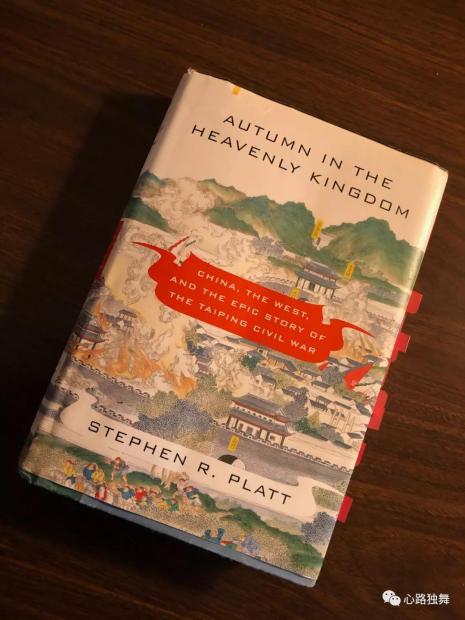阅读:0
听报道
丫丫秋天学期开始修AP世界历史课程,暑假老师布置一个阅读任务,阅读这本400多页的书籍,然后写出三页左右的书评。
作者:Platt, Stephen R.
书名:Autumn in the Heavenly Kingdom: China, the West, and the Epic Story of the Taiping Civil War. (直译:太平天国的秋天:中国、西方、和史诗性的太平天国战争故事)
出版商:New York: Alfred A. Knopf, 2012.

书很晦涩,纯学术类型,我翻了几页觉得读起来挺困难;对美国孩子来说,内容也比较偏,在美国非常小众,是讲中国历史上的太平天国战争的。我曾担心丫丫读不完这本书或者读完了写不出来好的文章,因为暑假的大部分时间她都在参加我们大学的一个生化实验室医学相关的研究项目,其余的时间或者在训练或者美国各地打篮球联赛,能够静下心来读书的时间很少。但我低估了她的自制力和求知欲,不论是在篮球夏令营的间隙,还是在飞去瑞士度假的飞机上或辗转瑞士城市之间的火车上,她一直在读这本书。

当读到她写的书评时,我彻底放心了,她把这本书读进去了,而且做了比较好的整理,提出了自己的观点,我把英文全文放在后面,下面是我的简要翻译。
从耶鲁大学获得中国历史的博士学位之后史蒂文·普莱特(Stephen R. Platt)写下了这本题为《太平天国的秋天:中国、西方、和史诗性的太平天国战争故事》的书籍,其中详尽介绍了十九世纪发生在中国的太平天国战争。正如在前言中所说,普莱特写这本书的初衷是澄清一个长期存在的误解,那就是十九世纪的中国是一个封闭的存在,因此发生在国内的战争只与本国有关,相反普莱特强调了外国势力介入对战争结果的影响,提出了“这个战争其实更是国际性的,因为中国内战的双方基本势均力敌,因此内战的结果很大程度就取决于1860年间来自其他国家外交和军事的介入”(引自Platt, xxv)的观点,同时通过引入外国介入的具体和战争后果对其重要性程度的证据证实了上述观点。
太平天国战争起始于洪秀全率领叛军和满洲军队作战,叛军迅速占领南方的首府南京,洪秀全将这里宣布为太平天国军的新基地,以此延伸叛军逐渐占领了南方的大部分城市,其中包括六个比较富裕的省份。但是这之后因为其他国家的开始介入尤其是英国,太平天国军的势头开始遭遇遏制,英国选择站在清政府一边的主要原因是认为这场战争影响了英国在中国的贸易,于是为清政府提供了先进的武器装备,从而让这场内战的天平开始扭转。
普莱特书籍里罗列了大量的证据,其中包括14页的证据清单。他特别喜欢引用来自新闻媒体的报道,譬如伦敦时报、香港日报、纽约时报等,尽管这些报道来自当时,但是作为论证证据来说使用新闻报道毕竟缺乏严密和准确性,而且也常自相矛盾,譬如他引用的一篇文章提到太平天国运动是一场“暴乱”,另一篇则认为战争的地方“充满活力、人民普遍比较快乐”,类似这种证据的自相矛盾其实从某种程度上削弱了普莱特论证的说服性。
在书的结尾普莱特再次强调了这场战争的后果,那就是中国开始了进一步的倒退,这种长远的影响证明了外国势力的介入实际上造成了中国的不稳定性,因为其干扰了内战的自然选择过程,从而改变了内战的结果,并因此带来持续深远的影响。尽管普莱特的论证有不严谨的一面,而且证据缺乏中立,但是结论还是很有说服力的,那就是如果将太平天国战争放在国际天平的角度上看,对其他国家也影响巨大。这本书虽然叙述方式和风格缺乏一致性因此读起来难度不小,但毕竟让我们了解了一场常被世界历史遗忘了的战争,并给这场战争赋予了一个新的研究角度,那就是外国介入对内战进程的影响。
以下是原文:
Platt, Stephen R. Autumn in the Heavenly Kingdom: China, the West, and the Epic Story of the Taiping Civil War. New York: Alfred A. Knopf, 2012.
After receiving his Ph.D. in Chinese history from Yale University, Stephen R. Platt has written a detailed account of the Taiping Civil War that occurred in China during the nineteenth century. Platt’s intention of writing this account, as he stated in his preface, was to go against “a long-standing misconception that China in the nineteenth century was an essentially closed system and therefore that a civil war… was something with relevance only to the country in which it waged” (Platt, xxiii). Platt accomplished this goal through demonstrating the influence of foreign powers, which he stated in the thesis,“The story of this war is necessarily an international one, because the two sides of China were so intractably balanced that the outcome was to a large degree determined by the diplomatic and military interventions of outsiders inthe early 1860s” (Platt, xxv). Platt excellently supported his thesis by showing the strong external interference on the war, as well as the war’ssignificance to the outside parties.
The war began with Hong Xiuquan bringing a group of rebels to fight against their Manchu overlords. The rebels soon took the southern capitalof Nanjing, where Hong declared the army’s new base as the Taiping Heavenly Kingdom. The Taiping conquered most of Southern China, including six of the most prosperous provinces. However, the Taiping began to struggle in maintaining their success due to foreign involvement, mainly from Britain. As Britain had sided with the Qing Empire and Manchu officials after the country thought that the rebels to be damaging to Britain’s trade. Thus, Britain provided the Qing with artillery as well as even a whole steamship flotilla. This foreign intervention would then impact the rest of the war’s events and even the outcome.
Platt’s book contained a substantial amount of evidence, which he included in a 14-page selected bibliography, in which, showed Platt’s heavy reliance on primary works as his sources. Additionally, he often quoted from news companies, such as the London Times, the Daily Press in HongKong, and the New York Times. Although it is beneficial to have primary sources as they originated from the period, the sources are also usually biased with inaccuracies. Many of Platt’s primary accounts would contradict each other, as people stretched the truth in order for them and whomthey represented to be in a good light. These contradicting accounts confusethe reader about what occurred. For example, Consul Harvey, an Englishmen, quoted in an article published in the Viennese paper Die Presse that“the Taiping… have destroyed everything and… was a movement of violence”(Platt, 283). Despite Harvey’s brutal reports on the Taiping, a few months before his publication was the discovery of a diary from a silk trader. The trader reported that he found the rebel-controlled province of Zhejiang “livelyand fertile... and the people were generally quite happy” (Platt, 262). This example demonstrated how by Platt relying on primary sources, his argument lost credibility due to inaccuracies.
In the conclusion of the book, Platt reflected on the aftermath ofthe war. China continued to degrade, and once the Manchus fell, they were replaced by “a republic that broke down almost immediately into civil war”(Platt, 363). Platt used this aftermath as an example of the lasting impact ofthe war’s foreign interference. By arguing that the interference caused instability, he stated, the events “echoed many observers from the time of the war who had argued that...Britain must stay out because the warfare in China was part of a natural dynastic change that had to follow through to its end” (Platt, 363).The change in power was a natural process that should have been undisturbed, which the British did not do. As the beginning of the war, the Taiping looked to be the clear victors, but the British had given the Qing an advantage which impacted the rest of the war’s events. Thus, the British pushed China off its natural course and plunged the country into a period of instability. Ultimately in this conclusion, Platt supported his thesis by showing how foreign involvement influenced the aftermath and outcome of the war, which is the basis of his argument.
Although Platt’s argument does have its flaws as his sources represent some bias and inaccuracies, the overall argument is quite convincing. By Platt providing the international perspective of the Taiping Civil War, he showed how the war held importance to other countries. For example, the British’s reason for siding with the Qing was because they believed it would benefit their commerce in China. Additionally, Platt demonstrated how foreign intervention had impacted the results of the war by narrating people such as Frederick Townsend Ward, an American whom the British hired to fight against the Rebels. Therefore, the argument that Platt made is quite convincing. However, is the book worth the read? Although the book can be challenging to follow at times due to Platt’s frequent and disorganized change of narrating perspectives, it is still worth the read. This book showed the significance of a war that often is ignored, and it gave the war a new perspective on the influence that the foreign intervention had in the outcome.
话题:
0
推荐
财新博客版权声明:财新博客所发布文章及图片之版权属博主本人及/或相关权利人所有,未经博主及/或相关权利人单独授权,任何网站、平面媒体不得予以转载。财新网对相关媒体的网站信息内容转载授权并不包括财新博客的文章及图片。博客文章均为作者个人观点,不代表财新网的立场和观点。




 京公网安备 11010502034662号
京公网安备 11010502034662号 